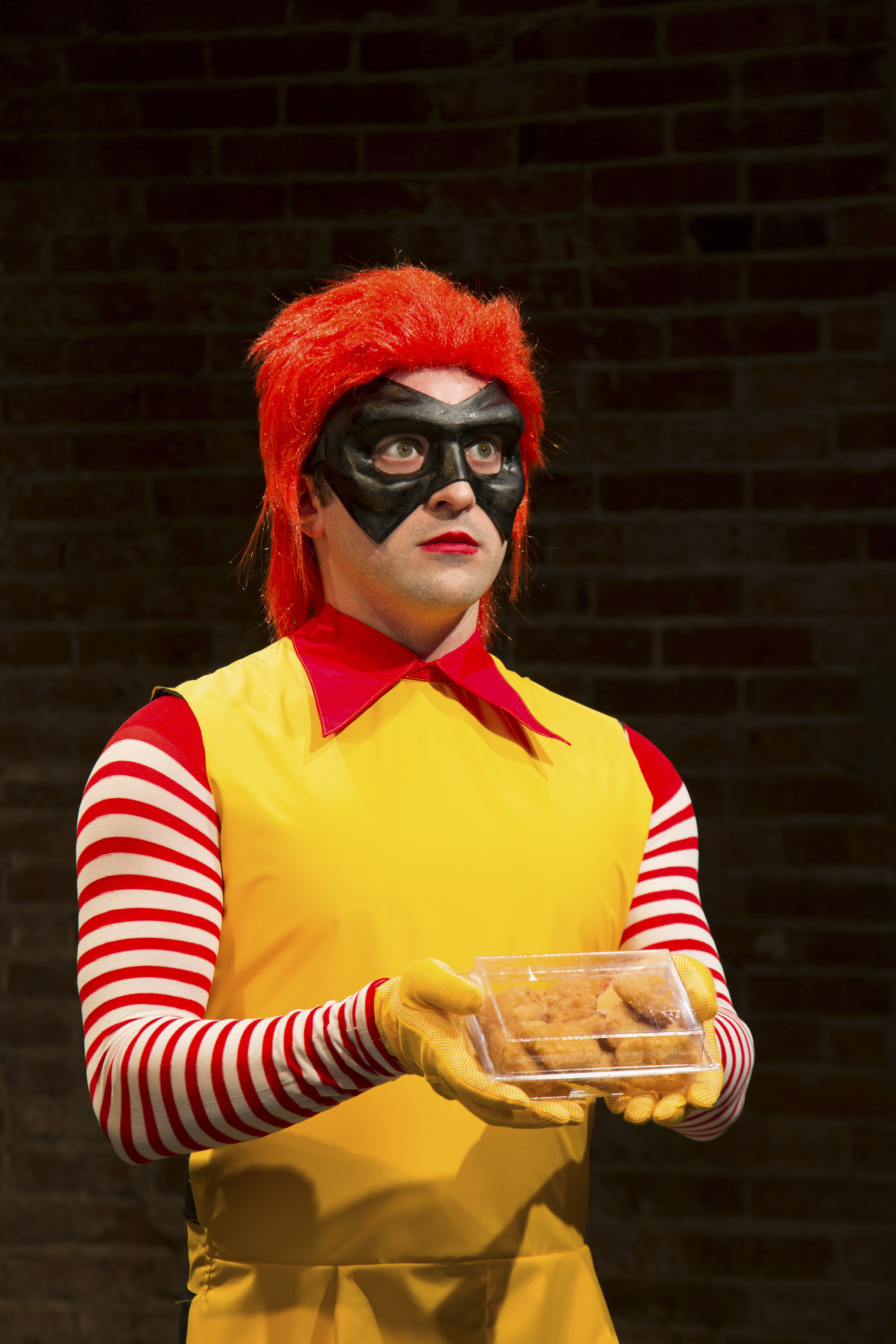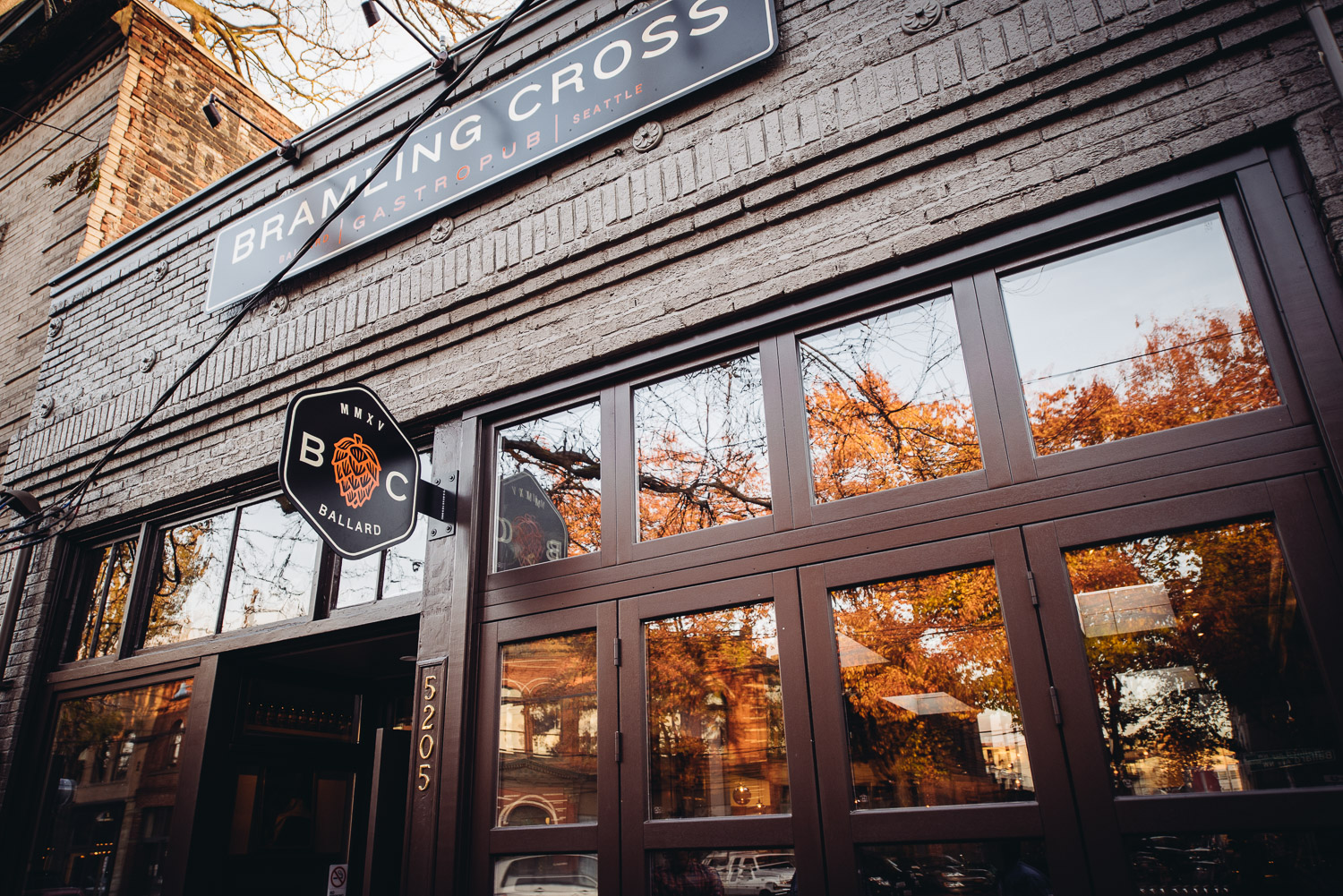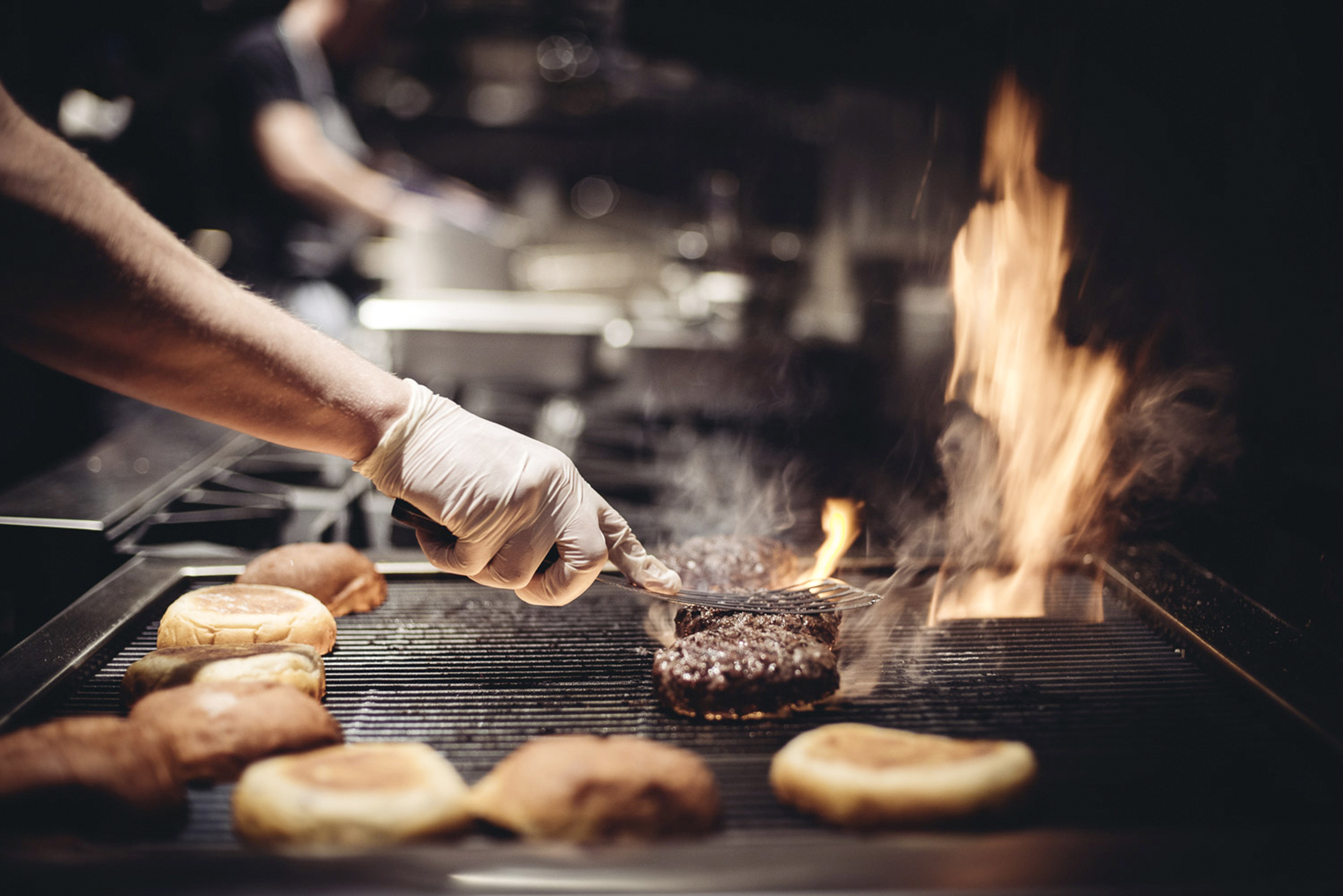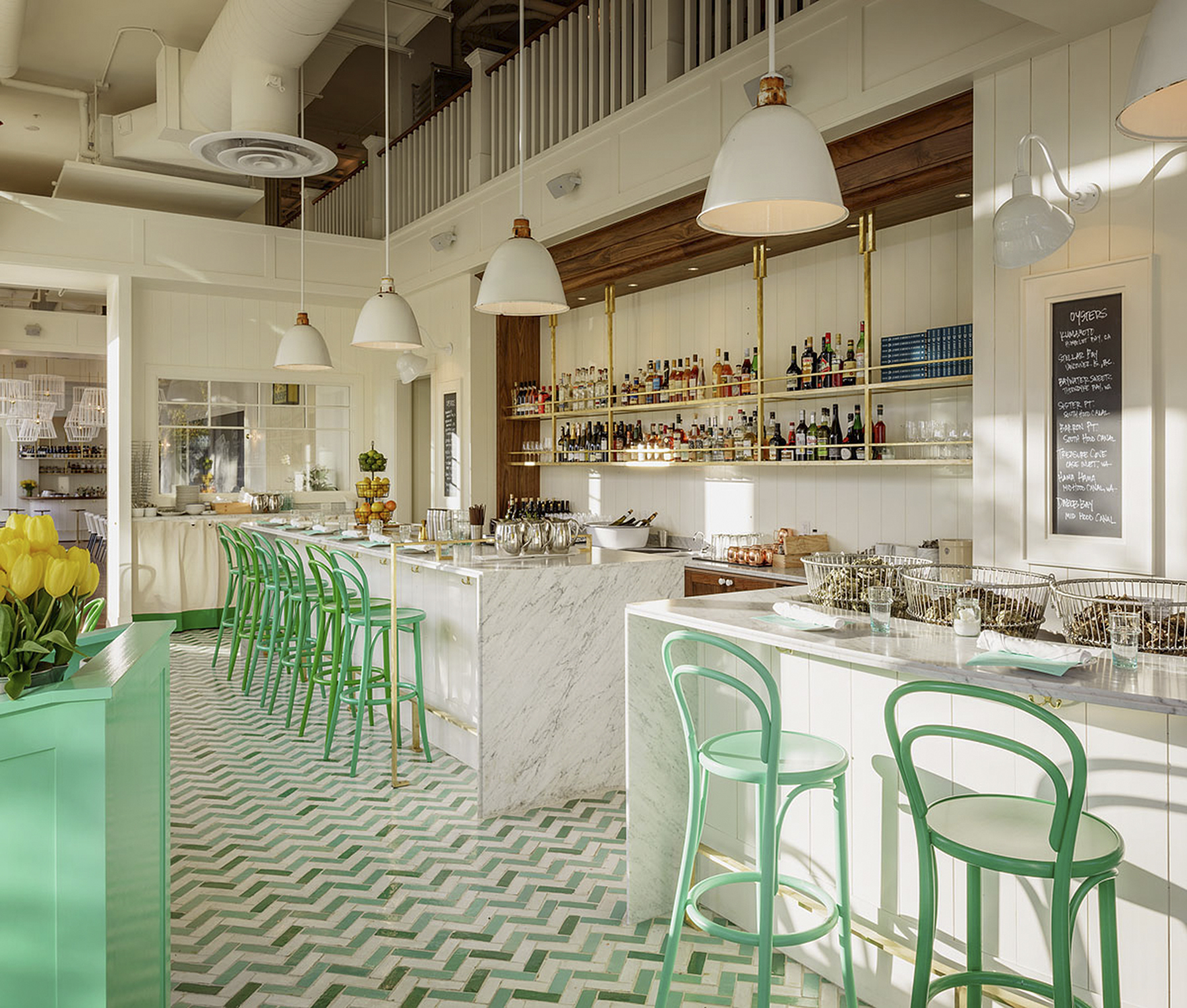Cafe Nordo, a pop-up restaurant/experimental cabaret-style performance (call it dinner theater if you like, though the folks behind it reject that term) has bounced among locations, including Theo Chocolate’s Fremont factory, for the past five years. Until now. The ensemble has claimed space in Pioneer Square’s Globe Building, the historic former home of the Elliott Bay Book Company, for its newly christened “Culinarium.” Its first production there, Don Nordo del Midwest, opened to a packed house last Thursday. You won’t see shelves of books, though, just exposed brick walls and high-ceilings.
I’d never been to Cafe Nordo, but I knew that food is the focus of its absurdist, comedic storylines; that actors and musicians interact and play among the audience; that “Nordo Lefesczki” is its mysterious (most likely fabricated) chef and main character, and that “dinner” itself is a kind of character. Besides that, I was in the dark (literally) when I entered the cavernous, barely lit space, where a tall, thin man lay motionless on the floor, ringed by audience members sitting at cabaret tables.
He was in fact Don Nordo (think Don Quixote), a brilliant chef who has yet to make his mark in the culinary world—so we are told by the narrator, the food critic who discovered him—but whose mission it is to save the Midwestern palate from blandness. If you’ve ever been to a Cafe Nordo show, you’ll finally discover Chef Nordo’s fictional back story.
After getting fired from an “agreeably dull” steakhouse because he tried to invigorate the menu, Don Nordo sets out to hire his own sous chef, posting an ad at the local Red Lobster. Nordo names the applicant Sancho (of course), despite his claim that “I’m not Latino.” The two, wearing upside-down colanders on their heads like helmets, set out on a series of food-inspired adventures that in the show’s first half seem designed mostly to set up jokes about our rabid foodie culture—territory that Portlandia has already thoroughly mined, and that feels somewhat trite. When the aroma of garbage beguiles the Don and leads them to a homeless encampment where fried fish skeletons are being cooked, lines like “It was so rustic to be ahead of its time” and “Everything is sourced within a mile” bring plenty of predictable laughter. When Sancho complains about the lack of salt, Don Nordo chides that “It’s how the chef wants it to be,” but adds that he has some salt in his pocket: “Himalayan.”
At this point, masked servers dressed in black bring the audience paper sacks (homeless style) of “Bacalao Tots & Mushroom Gravy,” which we unwrap and share with our fellow diners (there are about 10 tables of five). This witty, stylistic integration of the food into the performance takes it out of straightforward dinner-theater territory. However, the cod is completely lacking in salt, the accompanying sherry watery. Almost all of the nine courses of “Midwestern Tapas” are, in fact, bland (save for a perfect little bite of ham on pecan/majon cheese brittle): the very thing Don Nordo is fighting against, which feels unforgivable. I wondered if perhaps this was meant to be ironic, though it seems doubtful given the price of the show.
As the Don and Sancho take on myriad food obstacles—a food factory, chain restaurants, a taco-truck park—brawls ensue and their world takes on a fantastical quality a la Don Quixote, with multiple visits from a sort of drunken angel of gastronomy, played to great comic effect by Kate Hess with a cabbage-topped head and a cheap bottle of wine in hand. It is she who tells the Don it is time to seize his destiny and “Your critics are coming.” Come they do: a horde of taunting food writers (who spew sardonic lines like “Why does this taste like a funeral in my mouth?”) and angry McDonald’s workers (“No one has ever asked to see the chickens. There are no chickens”). For that scene, we’re served tasteless “Chicken McCroquettes” with the mustard sauce in the center.
Disillusioned, the Don decides he must do something truly mad and “almost ends the tale.” Later, Sancho finds him slumped at a salad bar at Olive Garden (cue bowls of salad with glass vials of toppings like blue cheese, pickled onions, and a sardine-stuffed pickled pepper). It is here, about halfway through the three-hour show, that the performance finally develops—as if, when the Don comes out of his stupor, the play too finds its energy. The live music—chords of Spanish guitar, bursts of flute and trumpet, and even the kitschy playing of kazoos, a miniature metal shopping cart, and colanders—has been a high point throughout the show, but now lends even greater ambience.
Scenes begin to feel like scenes (of which there are dozens, chapter-style in homage to the novel), rather than rote descriptions from the narrator; Sancho and the Don’s relationship gains heft, lifting it out of mere allusions to Don Quixote while allowing the jokes, delivered particularly well by Maximillian Davis as Sancho, to keep rolling. As the two vow to continue their quest, the performance’s quirky style gets even better. Insidious food-factory workers outfitted in yellow suits and goggles that resemble Breaking Bad’s Walter White bring us chorizo (the worst I’ve ever had) in a most disarming way, and a Food TV showdown between a sassy-mouthed mac-’n’-cheese food-truck owner and the Don and Sancho delivers pitch-perfect camp, though the accompanying tiny grilled cheese sandwiches with haloumi cheese and kimchi are serviceable at best.
In one of the better, more “serious” scenes of the night, a frosty-haired “Clone Queen” delivers a soliloquy about the sickness she suffers to make nature more sustainable, to engineer the most beautiful fruits and vegetables without bruises. Austere, icy trees made from plastic tubes and eerie notes from a cello seem to come straight from “her nightmares.” When Don Nordo sums up the bleakness with the line “It’s the fear of not having a peach in December,” it feels prophetic rather than prosaic.
The team behind Cafe Nordo deserves applause for the ambition of Don Nordo del Midwest. From riffing on one of the most famous novels ever written to clever tricks of service and inspired costumes and staging, there are certainly magical moments here. But, sadly, the food—the show’s entire raison d’etre—is unapologetically bad. “The proof is in the pudding,” says the narrator at the end of the show. Given the state of the meal, that line becomes truly double-edged.
nsprinkle@seattleweekly.com
CAFE NORDO The Culinarium, 109 S. Main St., cafenordo.com. 7:30 p.m. Thurs. & Sun. ($65/$90 w/wine flight); 8 p.m. Fri.–Sat. ($75/$100). Ends May 31.








